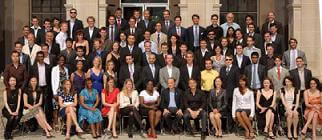How was Singularity University’s Second Summer? Ask the Students (video)

Share
Singularity University recently wrapped up its second summer graduate studies program (GSP '10). SU, started by Peter Diamandis and Ray Kurzweil, among others, aims at preparing humanity for accelerating changes in technology. How are they going to do this? By training students. For this year's GSP, 80 students spent 10 weeks learning about accelerating technologies from the some of the top minds in their field, including Vint Cerf, Ralph Merkle, Bob Metcalfe and more. How do you know the summer program a success? Well, you could look at the team projects that the students produced, which as we discussed before could lead to a dozen new tech startups. You could also just ask the students what they thought of their time -which is exactly what I did during the SU closing ceremony last Friday. Videos are below.
Not only does SU hope to "prepare humanity" for the future, they aim their students at doing the same. The GSP team projects challenge students to help one billion people in the next decade. It's seems appropriate then that SU is very globally minded in the construction of its student body. Over 1600 people applied for this year's GSP, and only 80 were selected. Judging by the comments of Diamandis and Kurzweil at the closing ceremony, a great deal of weight was put on making the students reflect the world they are hoped to change. 73% of students are from outside the US, with over 35 countries represented. 50% receive a partial or full scholarship (which is nice considering tuition is $25k). There's a wonderful amount of diversity, but the students did all seem to have one thing in common: these are driven individuals. 90% of the class want to start a business upon graduation. You can sense their ambition and excitement (as well as some exhaustion) in the brief interviews in the video below. There's one Executive Program alumnus thrown in with a bunch of GSP '10 graduates just to round out the perspective.
In case my on-the-street reporting just doesn't do it for you, Singularity University also produced their own video interviewing their GSP '10 students. Here's a video of that video (sorry for the poor quality) as seen during the closing ceremonies:
Be Part of the Future
Sign up to receive top stories about groundbreaking technologies and visionary thinkers from SingularityHub.


As one of the GSP students mentioned in the first video, the schedule for the summer program is grueling: 90+ hours of lecture, 55+ hours of workshops, 35 hours of onsite visits. Yet, despite all of this cramming I don't think you can consider Singularity University to be providing a technical education. That is, the focus may be on technological changes, but the students aren't going to be prepared to develop the science behind those technologies themselves - though some are in PhD programs and otherwise have educational backgrounds which may enable them to do so. No, Singularity University impresses me more as a sort of high-tech business school. Its students take the lessons their learn about emerging scientific fields and develop new startups that could leverage that understanding. Which, depending on your feelings on business school, might seem either brilliant or disturbing.
After talking with the GSP '10 students I'm definitely leaning towards brilliant. Each one seemed to have an uncanny sense on where their new knowledge might be best applied, not just for their own benefit, but for the good of humanity. Not a startup was mentioned that didn't have, at its core, the motive of improving the lives of as many people as possible. Every student I talked to discussed the expectations they had of themselves (and each other) to find ways of using technology for Good. Techno-optimism abounded, but so did techno-responsibility.
Which, in my book, is a pretty good indication that Singularity University is doing something right. I laugh sometimes when I hear people refer to the idea of the Singularity as the 'Rapture of the Nerds'. As if the only concern the techno-optimistic have is to escape the world around them. The truth is that science and technology have the potential to inflict great suffering on humanity, or to ease its suffering in equally great amounts. Institutions like Singularity University that not only teach their students what could happen, but also how to shape things for the mutual benefit of humanity, are working towards a brighter future. Talking with the GSP '10 students I was deeply impressed by their goals and their passions for solving the grand challenges that face the world. It's far too early to tell if the summer program will lead these individuals to accomplish great things, but I'm fairly confident that most will at least try.
Good luck to you all.
[image credit: Singularity University]
[video credit: Aaron Saenz/Singularity Hub]
Related Articles

This Week’s Awesome Tech Stories From Around the Web (Through February 21)

What the Rise of AI Scientists May Mean for Human Research

This ‘Machine Eye’ Could Give Robots Superhuman Reflexes
What we’re reading
